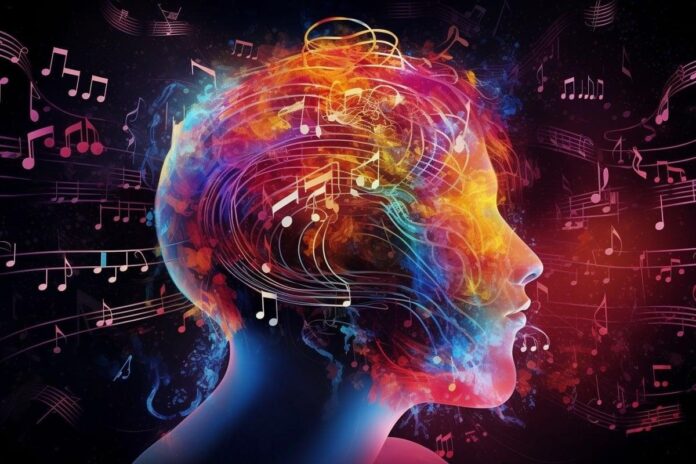“Unlocking the Healing Power of Music: From Stress Relief to Personalised Therapy”
Esther Swamidason, Faisal Shamim Khan
Since ancient times, music has been used for healing purposes. Ancient Greeks used music to aid mental health, and Native Americans used music to help with physical health. What makes it extra special is that Music knows no language nor age. This is the magical power of music therapy!
I recall a particularly stressful day at work. While returning back home that day, the song by Exo, “Power” started playing on the subway radio. Though I did not understand the words of the song, the music and the voices of the singers were refreshing and mood-lifting. It took my mind off things and helped me de-stress. This was my first-hand experience of the power of music!
How does music therapy work?
Our brains release a chemical substance called dopamine when we do enjoyable tasks. It is responsible for giving you the high and making you feel good. On the contrary, our body produces a hormone known as cortisol when we feel stressed out. Music has shown to reduce our cortisol levels and in turn making us feel calmer1. Music therapy is more than merely listening to music. A music therapist, who is a trained practitioner utilizes music to assist individuals in reaching their health goals. For example, if a person is having difficulty sleeping, a music therapist may construct a playlist of soothing music to help them relax and fall asleep. They also may use music to assist in physical therapy exercises and mental illnesses. In some instances, music therapy is used as a tool of communication, to help people with conditions such as selective mutism to express themselves2.
Music therapy in medicine
Music therapy has been utilized in various hospital settings to treat both mental and physical disorders. Like any novel therapy, the research is lacking to form concrete conclusions about its effectiveness. However, anybody can agree, music does make any situation better.
- Mental Disorders
Music therapy is most popularly used in psychological and psychiatric settings, especially in treating symptoms of depression and anxiety. Additionally, studies show evidence for music therapy helping in the general improvement of schizophrenia symptoms4. Similarly, music therapy has helped some people with dementia by reducing symptoms of anxiety and depression. However, despite a few studies showing that music therapy can improve cognitive functions like verbal memory, there is not enough evidence to prove that it has an influence on retaining memory overall5.
Music therapy also has a major impact on people with the Autism Spectrum Disorder, especially as an assistance to communication and understanding social cues. Though many studies showed no change in clinical symptoms, music therapy was successful as a communication and sensory tool during therapy. For example, some patients who were non-verbal were able to sing or hum a tune!6 It has also been an effective aid for people with post-traumatic stress disorder. Music therapy is used by psychologists to enable patients with PTSD process suppressed emotions and memories and promote relaxation in the latter stages of therapy. Hence, you could say that music therapy is a form of a self-expression tool7.
- Physical Disorders
Though music therapy is less known for treating physical disorders, its impact is undeniable. It is famously known for treating chronic pain, especially in cases of cancer and post-surgery healing. In such instances, music therapy is not used as the sole remedy for pain management but rather as a complementary treatment that enhances the efficacy of medicines that are already being taken by patients for pain8,9.
It is also used in stroke rehabilitation to recover speech and motor skills by giving patients auditory stimulation10. Similarly, music therapy has been found to improve the motor skills of patients with Parkinson’s disease. Using rhythm has helped a proportion of individuals have better coordination and enhance physical functioning11. The lesser known fact about music therapy is its capacity in treating respiratory disorders. Chronic obstructive pulmonary disease and asthma require effective management of breathing. With music therapy, patients are trained to control their breathing with synchronized music12, 13.
Future of Music therapy
The interconnection between mental wellbeing and physical health is being looked at more closely by physicians than in the past. Thereby, the potential of music therapy has great room for being of influence in many other diseases. However, research on the arena carries discrepancies due to low sample size and a lack of studies. The major reason for music therapy to be overlooked is due to it currently being a complementary treatment rather than having exclusivity for a disease. However, with the growing trend of prioritising evidence-based medicine and personalised medicine, music therapy has an exemplary potential.
Personalised medicine in the context of music therapy requires the use of a patient’s information on their physiological, psychological and cognitive profile. Currently, clinics use a one-size-fits-all model of music to cater to different ethnicities and age groups. Though music speaks a universal language, each individual responds differently to each genre of music.
Much research has been carried out worldwide, assessing the neurological response to different types of music based on geographical locations. But, the data has not been translated to treatment mechanisms. With the advancement of technology, we could hope for personalised playlists that provide customised interventions in music therapy! To add, real-time feedback on a patient’s response can quicken the trial and error process for therapists. Another possibility that has opened up through technology is the capacity for Global outreach and accessibility. Music therapy interventions can reach the underserved populations and remote areas through online platforms, tele-therapy and mobile applications.
Why talk about it?
Music has influenced all cultures worldwide, since the beginning of time. Despite this, we have not been able to improve the impact of music in medicine. At an era where drug resistance and pharmaceutical corruptions are escalating, adapting to traditional practices such as music therapy is becoming of dire necessity. Due to a lack of research evidence, many physicians are sceptic towards it being incorporated at an ordinary scale. That is why this area needs to be addressed better by both therapists and researchers alike.
As the rhythm of life beats on, music therapy harmonises ancient wisdom and cutting-edge science while allowing us to explore and embrace the melodies within ourselves. So, next time you’re feeling low, put on some music, and rediscover the healing symphonies life has to offer.
References
- Lata, F., & I. Kourtesis. (2021). Listening to music as a stress management tool. European Psychiatry, 64(S1), S609–S609. https://doi.org/10.1192/j.eurpsy.2021.1621
- Jones, K., & Odell-Miller, H. (2021, December 4). A theoretical framework for the use of music therapy in the treatment of selective mutism in young children: Multiple case study research. Nordic Journal of Music Therapy. https://www.tandfonline.com/doi/full/10.1080/08098131.2022.2028886
- Geretsegger, M., Mössler, K., Łucja Bieleninik, Xi Jing Chen, Tor Olav Heldal, & Gold, C. (2017). Music therapy for people with schizophrenia and schizophrenia-like disorders. The Cochrane Library, 2017(5). https://doi.org/10.1002/14651858.cd004025.pub4
- Geretsegger, M., Mössler, K., Łucja Bieleninik, Xi Jing Chen, Tor Olav Heldal, & Gold, C. (2017). Music therapy for people with schizophrenia and schizophrenia-like disorders. The Cochrane Library, 2017(5). https://doi.org/10.1002/14651858.cd004025.pub4
- Malak Bleibel, Ali El Cheikh, Najwane Said Sadier, & Abou-Abbas, L. (2023). The effect of music therapy on cognitive functions in patients with Alzheimer’s disease: a systematic review of randomized controlled trials. Alzheimer’s Research & Therapy, 15(1). https://doi.org/10.1186/s13195-023-01214-9
- Mayer-Benarous, H., Benarous, X., François Vonthron, & Cohen, D. (2021). Music Therapy for Children with Autistic Spectrum Disorder and/or Other Neurodevelopmental Disorders: A Systematic Review. Frontiers in Psychiatry, 12. https://doi.org/10.3389/fpsyt.2021.643234
- Landis-Shack, N., Heinz, A. J., & Bonn-Miller, M. O. (2017). Music therapy for posttraumatic stress in adults: A theoretical review. Psychomusicology: Music, Mind and Brain, 27(4), 334–342. https://doi.org/10.1037/pmu0000192
- Krishnaswamy, P., & Nair, S. C. (2016). Effect of music therapy on pain and anxiety levels of cancer patients: A pilot study. Indian Journal of Palliative Care, 22(3), 307–307. https://doi.org/10.4103/0973-1075.185042
- Inmaculada Valero-Cantero, Francisco Javier Martínez-Valero, Milagrosa Espinar-Toledo, Casals, C., Francisco Javier Barón-López, & María Ángeles Vázquez-Sánchez. (2020). Complementary music therapy for cancer patients in at-home palliative care and their caregivers: protocol for a multicentre randomised controlled trial. BMC Palliative Care, 19(1). https://doi.org/10.1186/s12904-020-00570-9
- Xu, C., He, Z., Shen, Z., & Huang, F. (2022). Potential Benefits of Music Therapy on Stroke Rehabilitation. Oxidative Medicine and Cellular Longevity, 2022, 1–11. https://doi.org/10.1155/2022/9386095
- Joaquín, M., Víctor Arufe-Giráldez, Ruiz-Rico, G., & Rubén Navarro-Patón. (2021). Music Therapy and Parkinson’s Disease: A Systematic Review from 2015–2020. International Journal of Environmental Research and Public Health, 18(21), 11618–11618. https://doi.org/10.3390/ijerph182111618
- Sliwka, A., Wloch, T., Dariusz Tynor, & Nowobilski, R. (2014). Do asthmatics benefit from music therapy? A systematic review. Complementary Therapies in Medicine, 22(4), 756–766. https://doi.org/10.1016/j.ctim.2014.07.002
- Huang, J., Yuan, X., Zhang, N., Qiu, H., & Chen, X. (2020). Music Therapy in Adults with COPD. Respiratory Care, 66(3), 501–509. https://doi.org/10.4187/respcare.07489


